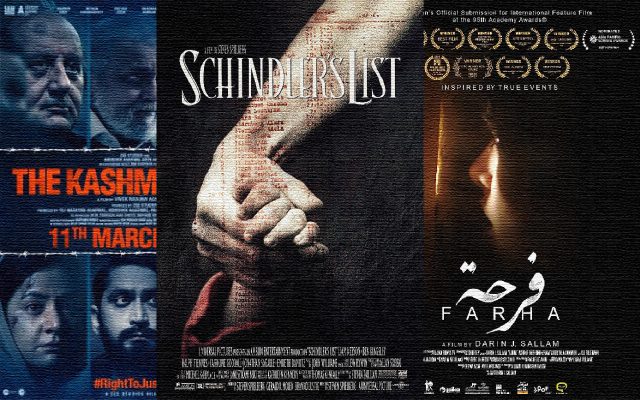Kashmir files (2022), Farha (2021) and Schindler’s list (1993)
War and terrorism always cost innocent lives; more than one can even imagine. Men, women, children, entire families, and generations are displaced or lost to the sands of time because of war. People have to flee their homes to save their lives and their cultures. A war does not only use up ammunition, it also depletes the intangible assets of a place, like the communities living there, the history, the culture, and the people. History is witness to this claim. In these times, we see news about the refugee crisis happening in the world, and it breaks one’s heart to see millions suffer. But that is for the present; even in earlier times, such crises have happened that have led to the displacement of millions.
During such tiring times, two movies claimed to give a voice to the voiceless of a genocidal event, One being Kashmir Files (2022) directed by Vivek Agnihotri claimed to give voice to the Kashmir genocide of 1990 and Farha (2021) a story of a young girl from Palestine who goes through a war that eats up her entire village. Netflix’s latest film on the conflict in Palestine, “Farha,” tells the story of the aftereffects of war through the eyes of a young girl.
Right at the back recently there was a controversy when the Jury head of the International Film Festival of India (IFFI) in his closing speech was critical of the film commenting that they (the jury) were all “disturbed and shocked” to see “a propaganda, vulgar movie” like The Kashmir Files in the competitive section of such a prestigious film festival. The Kashmir Files cherry-picks its victims and builds a narrative that is designed to fan the flames of communalism and the anti-Islam feeling that’s swept the country over the past decade. It’s playing to the gallery at best but in reality, is a cleverly crafted piece of propaganda that furthers the divisive political agenda of the ruling dispensation.
It’s clever because it’s presented as a piece of fiction, with the opening credits clearly saying that it “does not claim accurateness or factuality of historic events”. Now armed with the license to lie, the film decides to only pick facts that are convenient to its narrative and use them as the foundation of its story. On the other hand the movie “Farha” is based on the real-life story of Radiyyeh, who shared the story of her struggle during the Catastrophe to keep alive a tale of anguish, anger, agony, and sadness, which would have been easily written off by those in power.
To make the film Kashmir Files seem more authentic, the film references certain high-profile killings like the 1990 execution of BK Ganjoo, a telecommunications engineer, and Kashmiri Pandit who terrorists brutally killed. Agnihotri then adds a layer of what can only be called myth-making by adding twists of his own. The film shows Ganjoo’s wife being force-fed rice soaked in her husband’s blood, a scene that’s designed to outrage and spark blood lust. Strangely enough, this is an incident that Ganjoo’s brother said he had never heard about before and that his sister-in-law had never mentioned.
Meanwhile, in Farha a major chunk of the 92-minute film plays out in a food storeroom where Farha has been locked in by her father for her safety. Farha’s life for the next few days is quite literally thrust into darkness as she is only able to gauge what is happening outside through a tiny hole in the wall. The war outside her hiding place is mostly only depicted through the sounds she hears. The constant snap and crack of bullets, and the menacing boom of the bombs fill the storeroom as Farha, and the audience, are left wondering how far the danger is.
As far as comparisons with holocaust films go, The Kashmir Files is hugely different in one aspect and that’s the portrayal of how the common man reacted to the violence being meted out to his neighbors. In Farha, there is a scene where a Jew officer is not willing to shoot a baby and is attempting to draw a line somewhere and find his humanity. Similarly, countless films show the brutality of the Nazis, but almost every one of these films also has stories of survival enabled by common German citizens. If Tarantino’s Inglourious Basterds starts with a 20-minute scene of a German man risking it all to save his Jewish neighbours, Schindler’s List is a 3-hour tale of a German industrialist trying to save his Jewish employees. In Taika Waititi’s Jojo Rabbit, young Jojo sees his mother’s lifeless body hanging in the town square, a common punishment for German citizens who were found harbouring Jews.
Agnihotri, on the other hand, decides to paint a picture in black and white, where every Muslim is complicit and every Hindu is a victim. There’s a scene showing Kashmiri Hindu women being denied food and rations by their Muslim neighbours, something that works to push the genocide narrative but has since been rubbished by countless Kashmiri Pandits who abandoned their homes. If there’s one common thread that unites the stories of people who left Kashmir in the 1990s, it’s that their neighbours were sad to see them go. Thousands of Kashmiri Hindus talk wistfully about the land they were forced to evacuate, but rarely does one come across them bad-mouthing their neighbours.
The upper echelons of Hollywood are Jewish-dominated and yet films like Schindler’s List stick to demonizing Nazis, not all Germans. If you’re wondering why, it’s probably because real filmmakers understand that real life is never black and white. They also understand that a film based on history is only believable when it presents all sides of a story and avoids broad strokes to simplify a narrative. Propaganda peddlers though, just look at selling a version that will make their masters happy and fatten their bank accounts.
It, unfortunately, appears as Agnihotri did not mean to edify the experience that Kashmiri Pandits went through. The film opened up a debate on the cultural cleansing in Kashmir that took thousands of lives. Those who critique the film for exaggerating numbers miss the point. It’s not about the numbers of those who were killed. It’s about the inhumanity that drives man against man.
Many lives were lost before they could see the first ray of the sun. War takes a toll on not only the tangible but also the intangible properties. The aftereffects of the war on human lives reverberate through the winds of time and leave a lasting, and oftentimes scarring, mark on those affected by it. Remembering the Palestinian Catastrophe was one of the most chilling events in history and led to drastic changes in the geography as well as the history of Palestine. Wars are always lessons for humanity as to what not to do to maintain peace and harmony domestically and globally. “Farha” is a good testament to this claim, and it also serves as a reminder of the countless horrors faced by the people. There is no Oskar Schindler in The Kashmir Files. Schindler a German, singlehandedly saved nearly a thousand Jews by employing them in his factory. There is no lamb among the slaughterers in Agnihotri’s film. The Kashmir Files is not about humanism. It is about barbarism.






